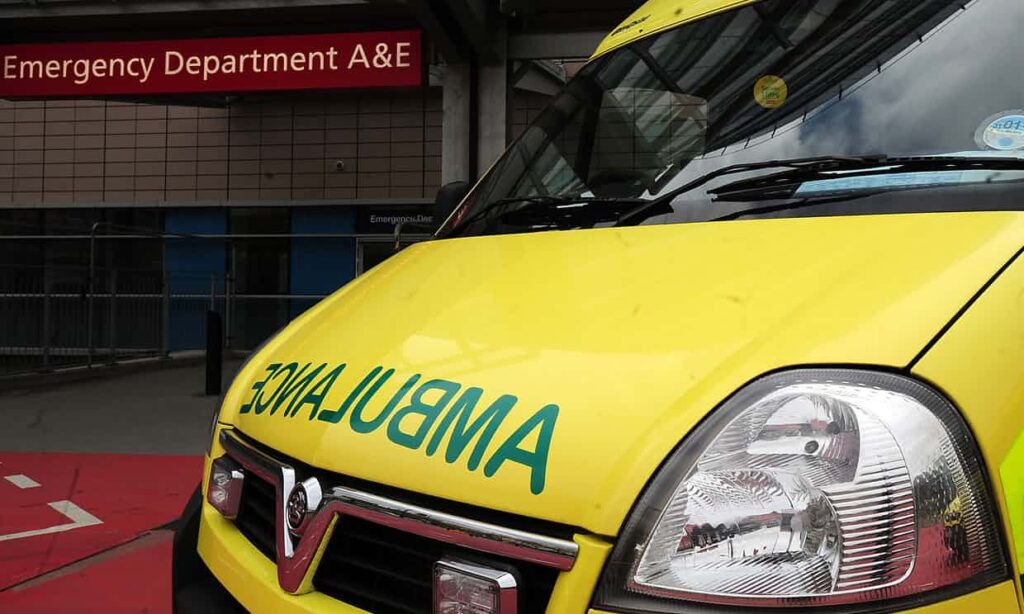Sharp rise in ambulance patient deaths in England is all part of the Tory plan

Serious incidents resulting in the death of a patient rose from 31 in 2012 to 72 in 2016 [Image: Rui Vieira/PA].
Mr Hunt is pushing the NHS towards privatisation and the way to do that, as Noam Chomsky has observed, is to de-fund the service so it starts to fail. When people complain, he can say that a publicly-funded health service doesn’t work and privatisation is the only way forward.
It is only after the service has been placed entirely in the hands of private companies that the public will realise privatised services are not better and do not receive more funds. Experience shows that money paid into such companies is drained out of them as profits, while investment dwindles.
Oh, and your services end up in the hands of foreign powers. Supporters of Brexit should pay particular attention to this, as they were fooled into voting for it in the belief that control would revert to the United Kingdom.
It won’t. Take a look at the privatised rail, water and energy companies.
The deaths of a few hundred people mean nothing to the Tories who are pushing these policies through – as those of use who have watched their behaviour towards benefit claimants and those on social care know very well.
A sharp rise in the number of patients dying unexpectedly while under the care of NHS ambulance staff has prompted warnings that the service is under “excessive pressure”.
NHS figures for England obtained under freedom of information (FoI) laws show “serious incidents” resulting in the death of a patient more than doubled from 31 in 2012 to 72 in 2016, rising year on year.
One trust noted that a serious incident meant a three-year-old asthma patient had died, and another death was logged as being caused by a delayed response linked to “no resources”. Deaths were also due to missed diagnoses and long delays, with one patient even taken to the wrong hospital.
Serious incidents are logged when the consequences for patients and staff are so significant they warrant investigations. The number of such reports that involved death, low, moderate or serious harm, injury and abuse rose sharply over the five-year period, almost doubling from 194 in 2012 to 376 last year.
Source: Alarm over sharp rise in ambulance patient deaths in England | Society | The Guardian
Vox Political needs your help!
If you want to support this site
(but don’t want to give your money to advertisers)
you can make a one-off donation here:
Here are four ways to be sure you’re among the first to know what’s going on.
1) Register with us by clicking on ‘Subscribe’ (in the left margin). You can then receive notifications of every new article that is posted here.
2) Follow VP on Twitter @VoxPolitical
3) Like the Facebook page at https://www.facebook.com/VoxPolitical/
Join the Vox Political Facebook page.
4) You could even make Vox Political your homepage at http://voxpoliticalonline.com
And do share with your family and friends – so they don’t miss out!
If you have appreciated this article, don’t forget to share it using the buttons at the bottom of this page. Politics is about everybody – so let’s try to get everybody involved!
Buy Vox Political books so we can continue
fighting for the facts.
The Livingstone Presumption is now available
in either print or eBook format here:
Health Warning: Government! is now available
in either print or eBook format here:
The first collection, Strong Words and Hard Times,
is still available in either print or eBook format here:










Nasty, deliberate and evil policies from evil people.
No one was listening when we voiced these Ambulance Crews concerns in 2014:
Gloucestershire Ambulance Service Underfunding putting Gloucestershire ambulance service and patients’ lives at risk.
Background Representatives of 38 Degrees Gloucestershire were called on by members of the South West Ambulance Service, who are worried about changes currently being implemented and the pressures they are under which in their view are seriously compromising the quality of service they are able to offer in the county. In response, as residents of Gloucestershire we have drawn up this report to alert the relevant authorities to these concerns
Summary The pressure of financial constraints is seen to be forcing the service’s managers to restructure services, and thereby reduce the quality and quantity of services the ambulance service provides. The ambulance crews acknowledge that this is not the type of service these managers would choose to provide if resources were adequate.
Ambulance staff suffer extra pressure, so take risks with patient care, that they feel are essential, due to inappropriate levels of cover (staff under-qualified for the situation they are sent to). Financial constraints appear to be resulting in the reduction of the quality of service offered in three inter-related ways: 1 Staff with lower levels of training who are not clinicians, and therefore on lower pay grades, are being crewed together, rather than with a Paramedic 2 Equipment levels are being reduced below acceptable levels on the ‘Patient Support Vehicles’ and there are no clinicians on these vehicles. 3 Manning levels are frequently inadequate to meet demands: on a daily basis. 4 Staff are being poorly managed (sometimes by managers in the process of redundancy).
Examples a. Fewer ambulances are available to cope with emergencies and lower qualified staff (non-clinicians) are finding themselves crewed together and expected to manage patients and situations outside of their scope of practice. b. Double-crewed ambulances1 are in some places being removed and replaced by ‘Patient Support Vehicles’ which are designed for walk-on, walk-off patients. c. These PSVs are manned by two Emergency Care Assistants, non clinicians, with no Paramedic on the vehicle. d. The Staverton and Stroud bases are suffering particularly from the reduction of paramedic cover, as double-crewed vehicles are replaced with PSVs2. e. Poor triaging is compounding the problem of both highly qualified crews in fully equipped ambulances being sent to low-level incidents and vice versa: inadequately trained crew and under-equipped ambulances being sent to 1 DCAs are the best equipped ambulances, normally staffed with both a qualified paramedic and an Emergency Care Assistant, non-Clinical, for use in emergency response occasions 2 Cirencester, thanks to the intervention of the local MP, has retained its second DCA but this vehicle is frequently not available in the County as it is called to deal with shortages further south.
critical emergencies. And in some instances, ambulances being sent over-long distances to emergencies that need very prompt treatment.
These changes, downgrading the number and equipment levels of available ambulances, have been implemented at the Staverton base with effect from 3rd June 2013 and Stroud, and are anticipated at one other ambulance station, to replace Cirencester Station shortly. Thanks to the intervention by the local Member of Parliament in Cirencester, that base is being protected against vehicle downgrading. However, along with other Gloucestershire ambulances, they are being used daily out of the County to cover vehicle shortfalls elsewhere.
If utilised correctly, PSVs could have a positive impact but not at the cost of reduced numbers of frontline, 999 emergency ambulances. Prior to the introduction of the PSVs, crews reported frequent general radio broadcasts of emergency calls, asking for any DCA’s to be available to help, and emergency backup requests for Response Cars, when no ambulances were available (known in the service as ‘stacking’) on a daily basis, sometimes hourly. This evidences the need to keep all the frontline fullyequipped ambulances (DCAs) in service, with the lower care capacity vehicles being used to complement, not replace, the emergency cover.
The merging of emergency and scheduled services within the SWAS has also created extra pressures, as ambulances are diverted to other areas in the expanded region of the South West Ambulance Service Foundation Trust – in particular crews from Gloucestershire are finding themselves diverted to respond to calls over greater distances, especially to the Swindon and Bristol areas and further south, leaving Gloucestershire’s service levels depleted, putting people’s lives in Gloucestershire at an unacceptable risk.
We understand that the decision has now been taken to contract out the third service providing scheduled hospital transport – the Patient Transport Service. One consequence of this is that the vehicles in that fleet will not be available to backup the SWASFT fleet, so the flexibility offered by all services being provided ‘in-house’ will be lost. Furthermore, the concomitant reduction in budget with the PTS being hived off, could lead to further cuts in the A&E services.
Changes, both those directly resulting from the merger of the Great Western Ambulance Service into the SWASFT Ambulance Service and others prior to that event, are being implemented too quickly and too frequently. In talking to several ambulance staff it was very apparent to 38 Degrees members how confused they are about which regulations and systems are now current.
As a result of these factors, staff morale is at an all time low and stress levels are increasing amongst the workforce.
Furthermore, 38 Degrees members are extremely concerned that they were called on by ambulance service staff to expose these worries that they have over the service they are loyal to. The reason they did this is that they are not confident that their personal positions will be protected if they act as ‘whistle-blowers’ themselves.
Call for action We, the members of 38 Degrees Gloucestershire, an informal organisation comprising concerned people in the County witnessing worrying pressures on the services they rely on, ask that you do whatever you can to help these concerned staff to maintain the integrity of the service they provide in the County, and which they are proud of.
The central needs appear to be for a short-term funding boost to carry the service
This report was not an attack on the Ambulance Service, but in support of the crews who were trying to inform the public of the risks to life, that the deliberate underfunding was having on the services ability to deliver.
The Tories know exactly what they are doing, it is deliberate policy, and the brilliant Noam Chomsky summed it up perfectly.
The other side to this story is that we do have the money to fund all our public services properly, how did we manage before these Tories came into office?
The clearest examples to the Tory lie that there is no magic money tree, is how we are able to shake it when it is politically advantageous to them, we bailed out the banks, Cameron said that money was no object during the floods of the Somerset levels, he would do whatever was necessary, although prior to the floods he sacked half the environmental workers working on the levels, to so say save money. Then to top it all, Theresa May after making draconian cuts to public service budgets, found a £1 billion bribe to keep her party in office.
We have the money we need to fund all our public services, but the Tories are deliberately starving them of it in order to privatise it; our lives mean nothing to them, so long as they and their friends can profit from it.
I cannot keep up with all their evil doings